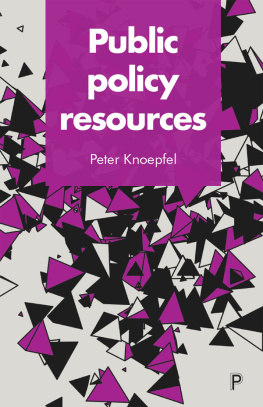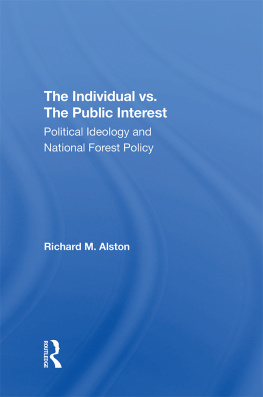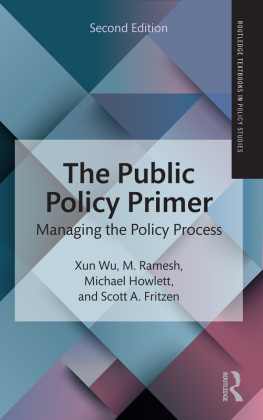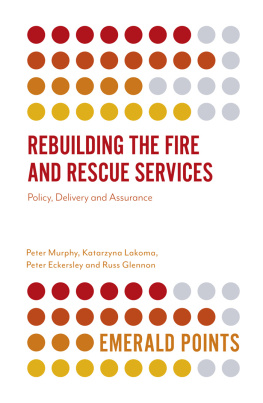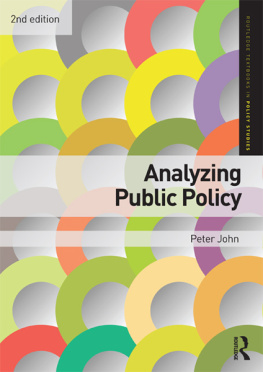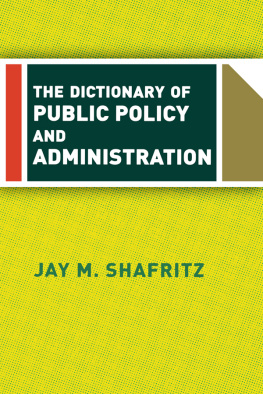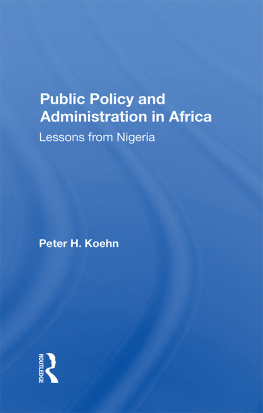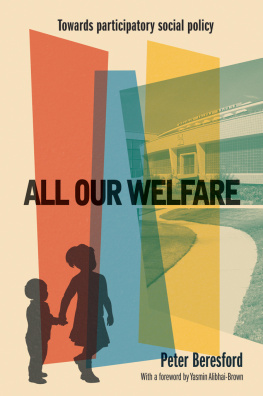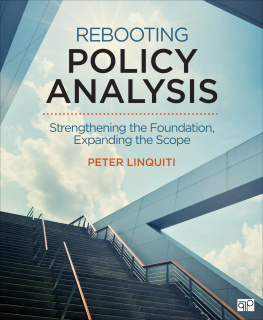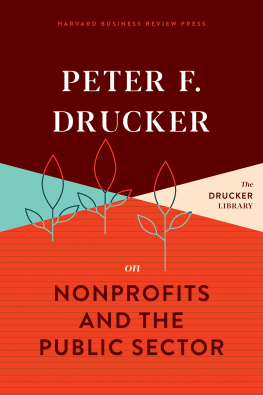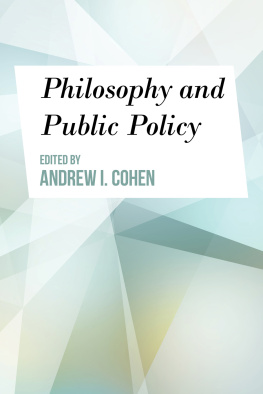PUBLIC POLICY RESOURCES
Peter Knoepfel
Translated from French; first published in 2017 by Seismo-Verlag, Zurich
First published in Great Britain in 2018 by
Policy Press University of Bristol 1-9 Old Park Hill Bristol BS2 8BB UK Tel +44 (0)117 954 5940 e-mail pp-info@bristol.ac.uk www.policypress.co.uk
North American office: Policy Press c/o The University of Chicago Press 1427 East 60th Street Chicago, IL 60637, USA t: +1 773 702 7700 f: +1 773-702-9756 e:
Policy Press 2018
British Library Cataloguing in Publication Data
A catalogue record for this book is available from the British Library
Library of Congress Cataloging-in-Publication Data
A catalog record for this book has been requested
ISBN 978-1-4473-4505-3 hardcover
ISBN 978-1-4473-4507-7 ePub
ISBN 978-1-4473-4508-4 Mobi
ISBN 978-1-4473-4506-0 ePdf
The right of Peter Knoepfel to be identified as author of this work has been asserted by him in accordance with the Copyright, Designs and Patents Act 1988.
All rights reserved: no part of this publication may be reproduced, stored in a retrieval system, or transmitted in any form or by any means, electronic, mechanical, photocopying, recording, or otherwise without the prior permission of Policy Press.
The statements and opinions contained within this publication are solely those of the author and not of the University of Bristol or Policy Press. The University of Bristol and Policy Press disclaim responsibility for any injury to persons or property resulting from any material published in this publication.
Policy Press works to counter discrimination on grounds of gender, race, disability, age and sexuality.
Cover design by Hayes Design
Front cover image: istock
Reader's Guide
This book has been optimised for PDA.
Tables may have been presented to accommodate this devices' limitations.
Image presentation is limited by this device's limitations.
Contents
List of tables and figures
Tables
Figures
Preface
This book sets out to demystify the idea of public power as it can be observed through public policy analysis, and to demonstrate it at work in everyday contexts. As part of this process it shows that it is possible to observe policy actors close up, and to pinpoint their share of the responsibility for the results obtained through their use of public action resources. Although this process involving the monitoring and management of the activities of public authorities remains a central issue for political science, and 'resources' are the focus of considerable attention these days, it is worrisome to note that fewer than two dozen authors throughout the world have attempted to provide a precise definition of this phenomenon, to identify its different categories, and to provide a sufficiently robust and operational typology for analysis of the policy actors' games that lead to everyday legislative decisions and the implementation of public policies.
This book proposes to fill this gap. I wrote it with my fellow citizens in mind who invest time and effort in public service. The text does not see itself as 'political' or as siding with one or other of the groups involved in the different public policy stages; rather, it aims to provide equal support to public sector collaborators and to the representatives of interest groups and policy beneficiaries to gain a better understanding of their own activities, and of the resource-related strategic and investment choices made by other actors involved in the public policy process.
The book reflects the fact that the 'people' are always more intelligent than the experts. For me, these 'people' include, among others, the communal council of my commune of Crissier (canton of Vaud), of which I was a member for 27 years, the hundreds of doctoral and post-doctoral (habillants)
I would also like to thank Linda Gubler for her work on the layout and finalising of this book, Stphane Boisseaux for the final corrections and updates, Emmanuelle Buchard for copy-editing the French text, and last, but not least, Susan Cox for translating the original French version into English.
Grignan, 18 October 2017
Notes
IDHEAP, in chronological order: Serge Terribilini, Sonja Wlti, Chistophe Clivaz, Stphane Nahrath, Jean-David Gerber, Tobias Hagmann, Jrme Savary, Lee Nicol, Mirta Olgiati, Markus Rieder, Rmy Schweizer, Johann Dupuis, Guillaume de Buren, Melaine Laessl, Vladimir Condo, Pablo Dussan. And external: Frdric Varone, Helmut Weidner, Corinne Larrue, Jean Simos, Patrizia Baroni Cedro, Peter Glauser, Ingrid Kissling-Nf, Alexander Flckiger, Antonio Osada, Chlo Vlassopoulos, Emmanul Reynard, Lean-Marc Dziedzicki, Kurt Bisang, Tourane Corbire-Nicollier, David Aubin, Mathieu Bonnefond, Miritxell Costej Florensa, Christian Brthaut and Taras Tretiak.
This book also provided the basis for a subsequent book on Swiss environmental policy (Knoepfel et al, 2010), which adopted most of the concepts presented in the earlier work and developed them in further detail. Versions of the 2006 book have been published in Spanish, English, German, Ukrainian and Canadian French. The English version is: Knoepfel, P., Larrue, C., Varone, F. and Hill, M. (2011) Public policy analysis, Bristol: Policy Press.
Introduction
Any observer of the public or private actors involved in the production of public action will encounter frequent complaints about the lack of resources available to these actors. A common statement likely to be heard in this context is: 'I would like to take action, but I do not have the necessary money, legal basis, people, time etc.' Surprisingly, such statements are made not only by marginal actors but also, and perhaps even more often, by individuals and groups that the observer would identify as powerful political-administrative, economic or social actors who enjoy a high degree of public visibility and a strong presence in a considerable number of policy contexts. Moreover, this observation is not limited to the development of new activities that may be initiated by these actors; it also concerns the implementation of follow-up interventions or inventions involving the production of public action in existing areas.
Aside from the fact that these complaints form part of the daily rituals of political-administrative actors and are made with a view to ensuring the maintenance or enlargement of their resource portfolios, the size of which is generally considered a reflection of their 'power' and political importance, in many cases they constitute a justified response to the budgetary cuts that affect the actors' scope for manoeuvre and, as a result, the effectiveness of 'their' policies.
The critical observer will confirm, however, that these complaints are frequently focused on known action resources that have been the subject of debate since time immemorial. The resources in question here are financial, legal, human and, of course, temporal in nature. One of the core messages of the concept of policy actors' resources consists, however, in the firm premise that there are at least six other categories of resources, which surprisingly receive little attention in the debates surrounding public policy resources. The resources in question here include Information, Organization, Consensus, Property, Political Support and, one of the oldest resources of all, which I refer to as Force.


